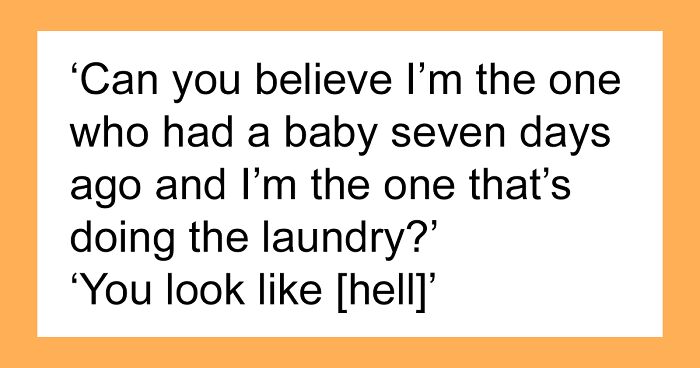
Man Finds It Funny His Wife Is Doing The Laundry 7 Days After Giving Birth, People Call Him Out
InterviewHousehold chores is one of those things probably none of us like to do. When living with other people, sharing cleaning duties can be tricky. That complexity can become more complicated between a man and a wife in heterosexual relationships, where gender norms and childhood role models come into play.
Laura Danger, better known on TikTok as thatdarnchat, shared her reaction to a video posted by another couple. In it, a husband films his wife doing laundry just seven days after she gave birth to their child. Laura reacted to the video talking about how most women in relationships take on the mental load, and how important it is to discuss division of labor in the household, and agreed to tell Bored Panda more about it.
A video in which a wife does laundry 7 days after giving birth has gone viral
Image credits: @thatdarnchat
“Can you believe she had a baby seven days ago? Oh my God, you look great.”
“Can you believe I’m the one who had a baby seven days ago and I’m the one that’s doing the laundry?”
“You look like s**t. I take it back.”
In the comment section, everyone’s like, let her rest and she’s like, “No, I felt good. I just wanted to get up and get some things done.” I’m not saying this is the case here. But it’s a really good example of why taking full responsibility for a task is really important.
While she was resting, she was thinking about what things needed to get done, which is why she got up and started doing them in the first place.
Laura Danger, a life coach and educator, shared her opinion on the situation and talked about how women in cishet relationships tend to carry more of the mental load
Image credits: @thatdarnchat
Whether she was responsible for the laundry getting done, or the division of labor was not clear in the household. And when the division of labor is not clear in a household, it’s on someone’s mental load.
In many cishet households, women are carrying more of the mental load. But that means that they are anticipating what needs to be done. They’re using their mental space to navigate and engineer what needs to be done in what order in order for things to not fall apart.
Which means that sitting idly by can cause more stress than just getting up and doing it.
She explained that getting up and cleaning might feel better even when you’re feeling under the weather – it’s better than sitting and knowing nothing’s getting done
Image credits: @thatdarnchat
And so yes, sometimes even when someone’s sick, or recovering from giving birth, getting up and doing things can feel better than sitting on the couch. How do you care for someone who is recovering from a birth? You anticipate your family’s needs and you take full responsibility of getting it done.
Supporting your partner who just gave birth is not just saying “I’ll get things done, tell me what you need help with around the house.” It’s taking full responsibility.
Ahead of the birth you can learn how to get things done, you can practice getting multiple things done, and doing the mental load for yourself. Supporting your partner in their healing means being reliable and navigating the mental load so that they can truly rest.
She said she was fine. I’m gonna believe that she was fine, but there’s a better way.
Laura’s video went viral and racked up nearly 7 million views
@thatdarnchatIm curious what you all think about that commentary from the camera person. ?♬ original sound – Laura Danger
No harm, no foul: the mom in the video cleared up the situation, saying that this was just a joke between her and her husband
The mom in the video, Katelyn Campisi, has clarified that there’s no drama – she and her husband were clearly joking. “In that video in particular, I had decided to switch the laundry while he tended to the kids because I just wanted to do something that felt normal,” she told The Independent. “We both meant nothing we said in our comebacks, which is the funniest part to us. We just mess with each other, it’s that simple.”
Katelyn thinks the video got such a visceral reaction because it might’ve struck a sensitive nerve in some people. “It’s probably ‘cause that video is an actual reality for some women and it stirred up some resentment, but for us, it was all fun and games,” she added in her conversation with The Independent.
Laura Danger, a life coach and educator who reacted to the video, explains what ‘the mental load’ is
Bored Panda reached out to Laura Danger, aka thatdarnchat on TikTok, whose reaction garnered over a million views. She’s a life coach and educator that shares her expertise online, and she agreed to answer a few questions for us.
First off, we begin with what can be considered “the mental load” in relationships. “It’s the decision-making, planning, and organizing that goes into keeping our lives together,” explains Laura. “For example, if you’re planning a meal for your family, you have to consider your family’s food preferences, allergies, schedules, dietary restrictions and needs, and so much more.”
“The mental load is making sure all of the boxes are checked off and also that each task interacts just the right way with all of the other tasks. Our lives are like big machines and it takes mental labor to fit all of the gears together.”
Laura says that even the most progressive relationships can fall into an imbalanced dynamic. “The social messaging that men should define themselves through work and women should define themselves through care and domestic labor is loud,” Laura points out.
Women tend to be the ones who are in charge of dividing the house labor. “Domestic labor is feminized labor,” she adds. “Housework is seen as women’s work, so women are taught to do it, encouraged to do it well and are judged on it.”
“Even if you’re not explicitly taught that your job is to do housework, the messaging is loud and clear in the media and in so many other aspects of our culture that women are innately better at housework,” Laura says.
Approaching the conversation of division of labor can be difficult, but it’s worth having nevertheless
The relationship coach says it’s important to come to the table with a positive intent. “You’re in a partnership because you love one another and want to show up for one another,” Laura tells Bored Panda. “Imbalanced partnerships fall into a trap of one person carrying more of the mental load than the other and you end up with one person over-burdened and the other left out.”
She says it’s important to start with positives. “If you two start taking the household and mental load seriously, you’re both going to feel more empowered to make decisions that align with your needs. You’re both going to feel more heard. You’re both going to feel valued and connected.”
If there’s an imbalance in the household, Laura says it’s easy to fall into what she calls the “Nag Paradox”. “It’s where one person giving directions or soliciting support ends up feeling like criticism to the other,” the life coach explains. “Then that person acts defensively and you ping-pong yourselves into resentment.”
Laura likes to use the Fair Play method and other tools to get her clients to communicate clearly and openly. “Ultimately, you can be as soft and gentle as possible, but if you’re stuck in this trap, it’s going to take two people being on board to heal. If you have access to it, I highly recommend couples counseling or therapy,” she adds.
Statistically, the mental load and bigger chunk of home-related chores are still assigned to women, but it’s a fast-changing world
It would be false to assume that the bigger part of household chores always falls on the shoulders of women. Healthline suggests that anyone can find themselves carrying the bigger mental load in a relationship, regardless of gender.
Men who grew up in one parent households, without traditional gender roles or had to care for younger siblings might be accustomed to taking on the bigger part of cleaning and tidying up. Laura also says that domestic work is skilled work: “Gender has nothing to do with how well someone does it. It’s learned.”
However, it’s still true that women tend to be primary caregivers and take on more of the cognitive labor. In a 2019 study of 400 couples, 88% of women said they managed the routines at home and 76% reported to be responsible for maintaining the order and regular standards at home. Same-sex couples, on the other hand, divide their chores more equally, researchers have found.
Some people got mad at the husband and saw his comments behind the camera as a red flag
Others in the comments didn’t see the big deal – the woman wasn’t forced and in this day and age, laundry isn’t a strenuous activity
All the comments in the article saying how easy it is to do laundry now (vs. a few generations ago) completely miss the point. It's not the chore itself. It's the mental load of being the one responsible for making sure the chores get done, whether or not she's the one actually carrying out the action. If you need to tell another fully grown adult what to do around the house, then you are sharing in the work. She shouldn't have to feel like it won't get done unless she oversees it or does it herself. She should be able to know and trust her partner will do it, without having to worry about it.
This. When I would ask my ex for help he would say " just tell me what needs done". I am too tired for that mental load You have two eyes and a nose, figure it out.
Load More Replies...I never rested much after having my kids, I literally went to the supermarket on the way home from having my daughter about 6hrs prior. At the time I felt it was fine just getting back into daily life, I never let up, I didn't give myself time to recover, just carried on as usual. Now, whether this is related or not I'll never know, I suffer from fibromyalgia- my body hurts daily, everyday tasks can floor me and leave me bed bound. Any illness I have or slight injury leaves me wrecked, even just a cold leaves me exhausted. Like I said, no idea if any of this is connected but I very much would advise my past self to take time and let myself recover, there's really no rush to get back to normal and there's definitely no medals for it either. My husband was more than happy to do everything, he still is, but I always wanted to pull my weight too - still do, but I need to understand my limits if I've a hole in hells chance of a decent quality of life. Rest when you need to!
I think also society sort of says these days "Once you've had the baby, it's time to get back to work or chores" and we've lost the very valid idea that after giving birth, the body needs rest, actual real rest.
Load More Replies...People get a momentary snapshot into people's lives and immediately think they can diagnose their relationship. Don't get me wrong, it's a good topic of conversation, but people reacting to that video are projecting their own feelings onto a brief social media post. The fact is, you don't know their relationship dynamic, how they behave, interact or divide responsibility.
All the comments in the article saying how easy it is to do laundry now (vs. a few generations ago) completely miss the point. It's not the chore itself. It's the mental load of being the one responsible for making sure the chores get done, whether or not she's the one actually carrying out the action. If you need to tell another fully grown adult what to do around the house, then you are sharing in the work. She shouldn't have to feel like it won't get done unless she oversees it or does it herself. She should be able to know and trust her partner will do it, without having to worry about it.
This. When I would ask my ex for help he would say " just tell me what needs done". I am too tired for that mental load You have two eyes and a nose, figure it out.
Load More Replies...I never rested much after having my kids, I literally went to the supermarket on the way home from having my daughter about 6hrs prior. At the time I felt it was fine just getting back into daily life, I never let up, I didn't give myself time to recover, just carried on as usual. Now, whether this is related or not I'll never know, I suffer from fibromyalgia- my body hurts daily, everyday tasks can floor me and leave me bed bound. Any illness I have or slight injury leaves me wrecked, even just a cold leaves me exhausted. Like I said, no idea if any of this is connected but I very much would advise my past self to take time and let myself recover, there's really no rush to get back to normal and there's definitely no medals for it either. My husband was more than happy to do everything, he still is, but I always wanted to pull my weight too - still do, but I need to understand my limits if I've a hole in hells chance of a decent quality of life. Rest when you need to!
I think also society sort of says these days "Once you've had the baby, it's time to get back to work or chores" and we've lost the very valid idea that after giving birth, the body needs rest, actual real rest.
Load More Replies...People get a momentary snapshot into people's lives and immediately think they can diagnose their relationship. Don't get me wrong, it's a good topic of conversation, but people reacting to that video are projecting their own feelings onto a brief social media post. The fact is, you don't know their relationship dynamic, how they behave, interact or divide responsibility.

 Dark Mode
Dark Mode 

 No fees, cancel anytime
No fees, cancel anytime 

















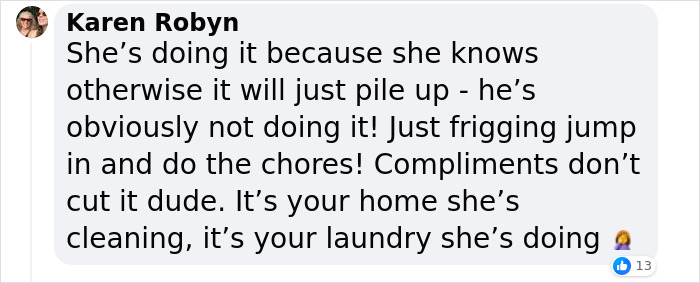















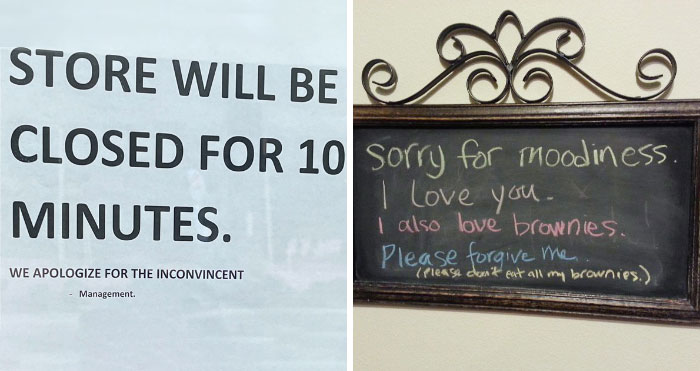


























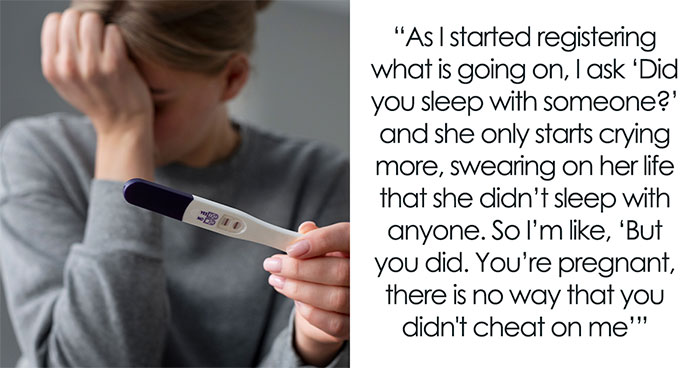


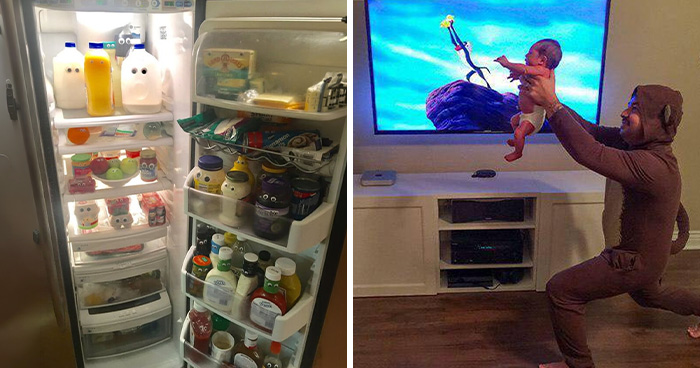
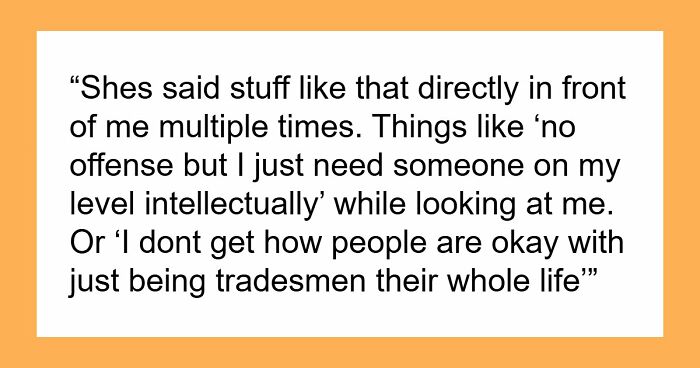

11
23